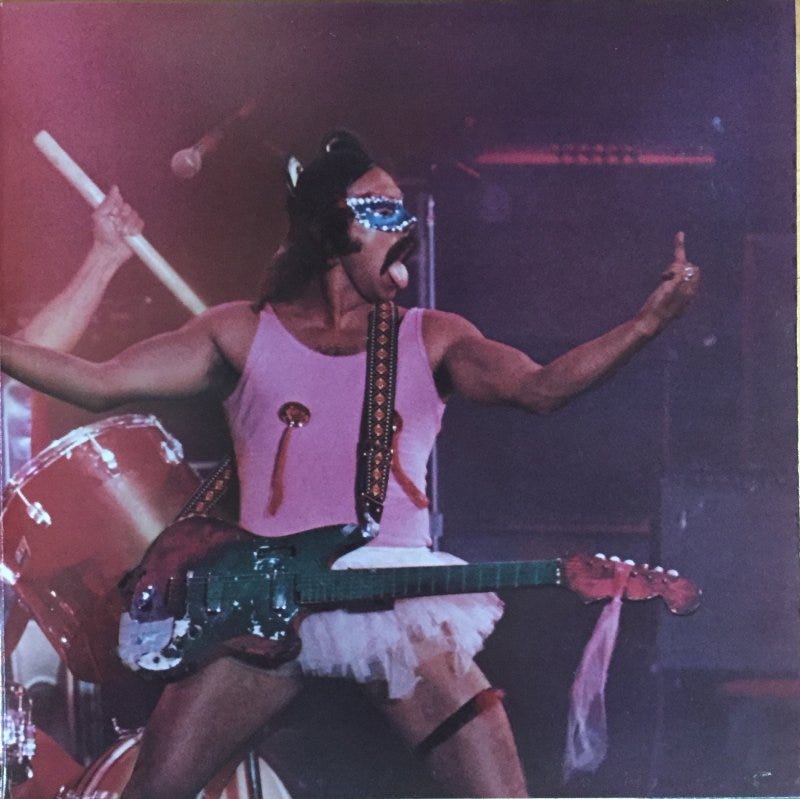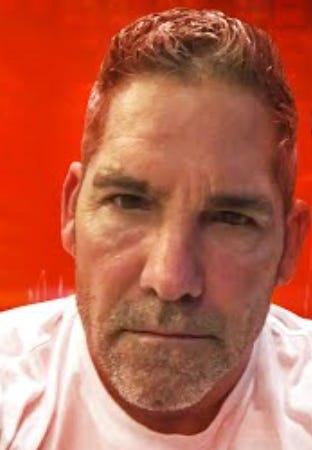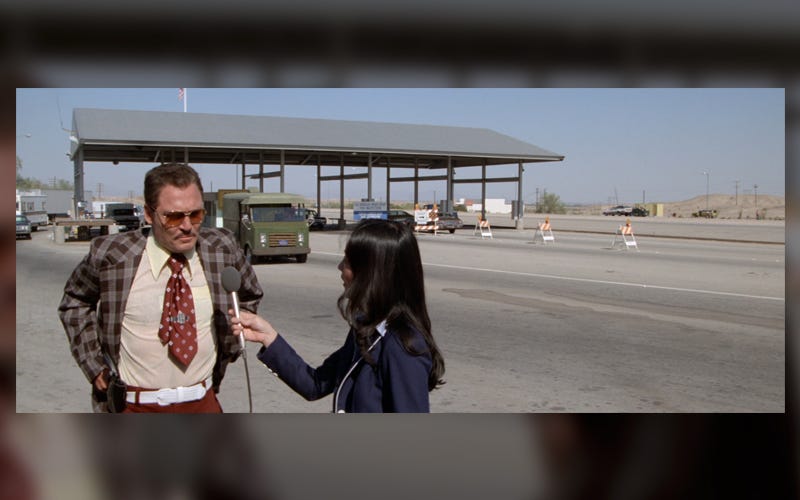Slacker Fest: Cheech and Chong’s Up in Smoke
The original (and surprisingly profound) stoner film
Welcome to Slacker Fest, where we document our research and analysis of mass media’s “slacker” archetype, part of our effort to broaden the genre with a slacker film of our own. Find our master list of entries here. Previous entry: Office Space.
I must admit to watching this inaugural entry of the Cheech and Chong franchise with low expectations, only forcing myself to because they’re iconic slacker characters credited with establishing the stoner genre. Also, Cheech plays one of the only Hispanic/Latinx slackers I know, so I wanted to see how that influenced the archetype. The scattered clips I had seen previously came off as basic sketch comedy, a-la Ernest or Mr. Bean, so I didn’t get my hopes up.
I’m glad to report that I was wrong and came away from Up in Smoke impressed by its not-even-so-coded social commentary. Its portrayal of “slackers” challenges our culture more than other entries in the genre I’ve seen so far. Either that, or I’m reading too much into a patchwork of bits that Tommy Chong himself said “doesn’t take a lot of brain.”
The basics
Release year: 1978
Premise: Two southern Cali kindred spirits meet and get arrested for possession of marijuana, only to be released on the technicality that their judge is drinking vodka. They form a band but, before they get much rehearsing in, set off on a quest to score pot that takes them on all sorts of misadventures.
Auteurs: Tommy Chong and Cheech Marin, with help from director Lou Adler’s very 70s camerawork. The film brought to screen various of their “countercultural” comedy routines, which at the time were groundbreaking. It’s amazing to think of today, but before Cheech and Chong no one was making mainstream entertainment aimed at stoners or “rock-and-roll kids.”
Notable characters:
Pedro de Pacas (Cheech), the Mexican-American stoner
Anthony “Man” Stoner (Chong), the White rich-boy stoner
Sgt. Stedenko, the hard-ass cop trying to bust them
Jade East and Debbie, a pair of flighty women the guys pick up while smuggling pot into the US
Strawberry, Pedro’s ptsd-stricken cousin and drug connect
Officer Gloria Whitey, the cool cop who lets Jade and her friends dip into confiscated drugs
Meet the slackers: Pedro, “ Man,” ...and basically every other non-cop
The film revolves around Pedro–an aspiring musician, broke even by the standards of his LA Mexican barrio–and “Man,” a privileged White hippie who recently abandoned his parent’s home. Despite their different backgrounds, these two bond instantly over their common love for music and, above all, weed.
While our heroes live in a society that overall rejects and persecutes them, their community of fellow stoners is surprisingly large. In it, you could include almost every single non-cop character (and at least one of the cops). It’s notable that, far from being lone misfits, they know a lot of like-minded people who are all together in conflict against more conservative, establishment forces. Contrast this, for example, with how The Office’s Peter Gibbons is mainly solitary in his slacker beliefs.
What do our slackers want and what’s in the way? (defining desire vs. opposing force)
There’s a few ways to look at this. On an external level, you have their desire for weed (the nominal engine of the story). A layer below that, their desire for weed interferes with their desire to make music–a classic situation of “inner conflict.” But, this being a stoner comedy and all, it’d be ridiculous to expect them to “overcome” their “internal flaw” of weed obsession.
At the deepest level, I think what they really want is free self-expression, both in the form of music AND in exploring pleasures like weed and sex. Their antagonist in this pursuit is a law enforcement outfit of repressed and reactionary officers obsessed with scoring a drug bust that will “take them right to the top [of their career.]”
How does the film define a “slacker” in broader terms?
On the surface, Up in Smoke casts slackers as sloppy and clueless people (Pedro confusedly pisses into a hamper seconds after we meet him) who pursue desires like drugs and sex with self-destructive vigor. But I think it’s more profound than that.
Take, for example, the “naturalistic,” healthy sensibilities it assigns Man. When we meet him, he’s being lambasted by his dad just as much for drinking a fruit smoothie as he is for being unemployed. He and Pedro are also partial to the arts, while their antagonists either hold or glorify military-adjacent professions.
Finally, the slackers in the film are consciously and actively disdainful of authority (not clueless and unintentional menaces). This is apparent in the glee with which Pedro fucks with the cops, for example by trolling them over their own intercom system. These are people fully aware that they have a bone to pick with society’s institutions, even if you or I may not see how they go about it as constructive.
With these extra layers, I see Up in Smoke defining a slacker more broadly as anyone who’s in any way “counterculture” and seen as deviant by established society: because of drug use, sure, but also because of the music they like, their religion, or their non-normative sexual/gender identity. This last one surprised me the most (given that the film is from almost 50 years ago), but it’s right there in the guys’ winning battle of the bands performance. While Pedro is dressed in a ballerina outfit, he sings these lyrics:
Daddy, he disowned me cause I wear my sisters clothes
He caught me in bathroom with a pair of pantyhose
My basketball coach, he done kicked me off the team
For wearing high heel-sneakers and acting like a queen
There are fans who interpret this scene as mocking 1970s rockstar fashion, basically Cheech and Chong joining in on punching down against people who dress like that. But this song felt to me more like a fuck-you to the “daddy” and “basketball coach” elements in society, especially since it comes at the end of an entire movie’s worth of those archetypes persecuting Pedro and Man.
Could anyone other than a white dude pull off slacking in this story world?
Off the bat, duh: one of the two main slackers is Mexican-American. But even beyond that, the film shows a very diverse community of slackers including women and Black characters (even if the depictions are thin and stereotypical). Also, unlike in other slacker films, there’s no “voice of reason” character who’s friendly with the slacker but tries to get them to correct their ways (a character usually played by a woman). In this film, the women are arguably even worse train wrecks than the lead males, and the film doesn’t apologize for them.
I’m less enthusiastic about how Pedro’s heritage played (or more precisely didn’t) into the film. Beyond using it as a springboard for certain gags (his family self-reporting to La Migra in order to get a free ride to a wedding is hilarious), the film didn’t explore it much, even though it took time to show us Pedro and Man’s contrasting socioeconomic backgrounds.
I guess that wasn’t the intent of these films, and getting too serious or heady about class/ethnic differences would have ruined what they were going for (I feel like I’m gonna be saying that a lot about every movie in these analyses).
What does the film see as “the enemy” in broader terms?
Beyond law enforcement, it’s the establishment’s rigid definition of “American normalcy,” which the film casts in opposition to everyone who doesn’t fit the mold. An interesting moment is when the cops, to infiltrate the battle of the bands, arrest a group of Hare Krishna devotees and take their outfits to use as disguises. That they see followers of eastern religion as blended with drug users and punk rockers betrays that their disdain isn’t for people breaking the law—it’s for anything that’s not “normative.”
(A couple of scholars take this further, saying the film holds “Whiteness” as the enemy and lays out the blueprint for its abolition. If I’m reading too much into this movie, at least I’m not alone!)
Does the film “approve” of slacking? Is it a broader anti-job statement?
I have to say it “approves” of slackers, because it doesn’t hedge or attempt any sort of “redeeming” moment for them (it also relentlessly mocks non-slackers). The film doesn’t get into WHY it approves, what positive “function” slackers serve, but I think its overall ethos is that there’s no reason to deprive people of the freedom to enjoy themselves and self-express however they see fit.
At the same time, this is much more of a pure stoner movie than an “anti-job” one, as it doesn’t touch the matter of employment beyond a couple throwaway digs at the concept of having a job.
Walt Wiltman’s favorite line
Grant Cardone’s work-humper take
“I also underestimated these guys. I thought they were nothing more than stoner losers, until I saw their OBSESSION with weed. They hone in on it like attack dogs, baby! OBSESSION is the #1 INGREDIENT to success. These young men could have a weed EMPIRE, as long as they cut their bandmates, hot girlfriends, family members–basically everyone they smoke weed with in the first place–out of their life. NO WEED DISTRACTIONS, JUST WEED OBSESSION.”
Are there any slacker-like innovations in the technique of the film itself?
Plot / Setting
Camera use
Mise-en-scéne / Color
Editing / Pacing
Sound / Music
This is a sketch-driven movie, with very little plot even by slacker movie standards. It contains none of the cause-and-effect, setup/payoff, or “character growth” narrative structures that classical Hollywood usually demands. I wouldn’t say this is unique to stoner movies (countless comedies in the early 2000s dispensed with worrying about coherent plotting), but a story this unworried about linearity feels very slacker in spirit.
Beyond that, the film has a very green color palette, with “natural” colors and textures often contrasted with more synthetic colors and rigid patterns on authority figures (parents, cops, etc.). I doubt this was the first instance of using this contrast to separate free spirits from squares, but it’s cool to find this bit of “coding” early instances of the stoner genre.
What would I want to keep for our slacker film? What do I want to leave behind or improve?
Above all, I like that the film shows society’s aggressive intentional attempts to stamp out slackers. The film’s antagonists are visibly, ideologically threatened by stoner culture (they'd make good Fox pundits today) which in my opinion makes them more interesting in their role than shitty bosses or dormant coworkers just going through the motions.
I likely won’t take the film's lead in its loose use of narrative–I think I’m too attached to cause-and-effect plots and enjoy the challenge of building them out. I’d also like to do more character exploration and, it goes without saying, will want to hold higher standards in portraying the identities included. It’s not the 70s anymore.
But despite these “flaws,” don’t get it twisted: this movie feels like one of the more radical, revolutionary pieces of film I’ve seen in a while. I did NOT expect to come away saying that.
Next entry: Clerks I, II, and III









Boudin Saved From Drowning is an incredible slacker film. https://www.criterion.com/films/756-boudu-saved-from-drowning